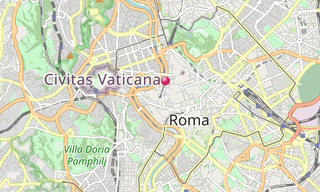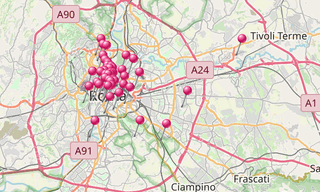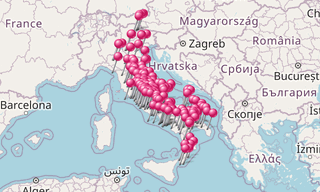The Piazza Navona is a city square in Rome, Italy. It is built on the site of the Stadium of Domitian, built in 1st century AD, and follows the form of the open space of the stadium. The ancient Romans came there to watch the games, and hence it was known as Circus Agonalis (competition arena).
Defined as a public space in the last years of 15th century, when the city market was transferred to it from the Campidoglio, the Piazza Navona was transformed into a highly significant example of Baroque Roman architecture and art during the pontificate of Innocent X, who reigned from 1644 - 1655, and whose family palace, the Palazzo Pamphili, faced onto the piazza.
It features important sculptural and architectural creations: in the centre stands the famous Fontana dei Quattro Fiumi or Fountain of the Four Rivers (1651) by Gian Lorenzo Bernini, topped by the Obelisk of Domitian, brought here in pieces from the Circus of Maxentius the church of Sant’Agnese in Agone by Francesco Borromini, Girolamo Rainaldi and Carlo Rainaldi and others, and the Pamphili palace, also by Girolamo Rainaldi, that accommodates the long gallery designed by Borromini and frescoed by Pietro da Cortona.
The Piazza Navona has two additional fountains: at the southern end is the Fontana del Moro with a basin and four Tritons sculpted by Giacomo della Porta (1575) to which, in 1673, Bernini added a statue of a Moor, or African, wrestling with a dolphin, and at the northern end is the Fountain of Neptune (1574) created by Giacomo della Porta.
The statue of Neptune in the northern fountain, the work of Antonio Della Bitta, was added in 1878 to make that fountain more symmetrical with La Fontana del Moro in the south. At the south-west end of the piazza is the ancient “speaking” statue of Pasquino.
Erected in 1501, Romans could leave lampoons or derogatory social commentary attached to the statue. A Christmas Market is held in the piazza.

.hero.landscape.jpg)

.jpg?w=256)
.jpg?w=256)
.jpg?w=256)
.jpg?w=256)
.jpg?w=256)
.jpg?w=256)
.jpg?w=256)
.jpg?w=256)
.jpg?w=256)
.jpg?w=256)
.jpg?w=256)
.jpg?w=256)
.jpg?w=256)
.jpg?w=256)
.jpg?w=256)
.jpg?w=256)
.jpg?w=256)
.jpg?w=256)
.jpg?w=256)
.jpg?w=256)
.jpg?w=256)
.jpg?w=256)
.jpg?w=256)
.jpg?w=256)
.jpg?w=256)
.jpg?w=256)
.jpg?w=256)
.jpg?w=256)
.jpg?w=256)
.jpg?w=256)
.hero.jpg?w=320)

.hero.jpg?w=320)
